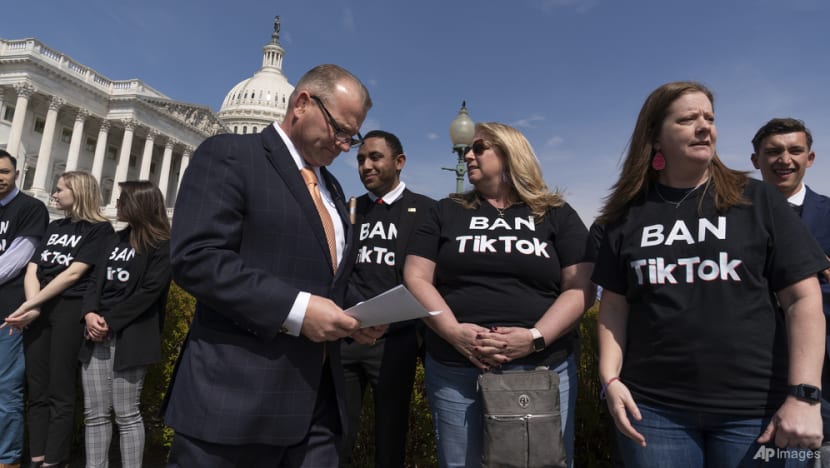Commentary: China’s silence on US TikTok ban speaks volumes
Washington seems more likely than ever to block the popular app. Beijing’s reserve exposes America’s weaknesses, says Catherine Thorbecke for Bloomberg Opinion.

Rep Troy Nehls, R-Texas, arrives for an event to call for the banning of TikTok, the hugely popular video-sharing app, at the Capitol in Washington, on Mar 23, 2023. (Photo: AP/J Scott Applewhite)
TOKYO: Beijing has been rather quiet as TikTok, the first globally successful app born from its domestic tech sector, fights for its life in the US.
The debate over whether Washington will ban TikTok due to perceived national security concerns related to the Beijing base of its parent company, ByteDance, has simmered for years. In the past, Chinese officials haven’t shied from harsh rhetoric voicing opposition. But now, as a ban seems more likely than ever to take hold, Beijing is holding its cards close to the chest.
In the months since legislation that would force TikTok to divest from ByteDance has made its way through Congress and now the courts, spokespeople for China’s foreign ministry have demurred requests for comment, referring to previous remarks. Namely, a March statement from commerce officials that China will resolutely “safeguard its legitimate rights and interests.”
But it would be premature to interpret the recent silence as any sort of indication that Beijing will take this lying down. United States firms with exposure to the world’s second-largest economy, from Apple to Tesla, should brace for collateral blows if a tit-for-tat escalates.
And policymakers would be unwise to underestimate the might Beijing may deploy in response to what it has previously decried as unfair “bullying”.
A high-stakes DC Circuit Court hearing last week did not go well for TikTok. The odds of it halting a ban plunged from 70 per cent to 30 per cent, according to Bloomberg Intelligence analysts. And if it fails to win this court battle, the likelihood of undoing that loss is 10 per cent.
CHINA WOULD NEVER ALLOW FORCED SALE OF TIKTOK
While government spokespeople have shown restraint, Chinese state-backed news outlets offered a window into official thought. Shortly after the Senate passed the ban legislation, the China Daily ran an editorial warning: “The century of humiliation won’t be repeated over TikTok.”
It indicated that Beijing views the US attacks on the popular app as in line with an historical pattern of Western exploitation, dating back to when British armies forced Chinese people to buy opium. It warned that attempts to impose coercion and subordination will fail. Separate editorials in other outlets similarly accuse the US of trying to “plunder” ByteDance.
Even policymakers on the US-China Commission can’t seem to grasp that Beijing, and ByteDance, would never allow a forced sale of its crown jewel algorithm to a foreign buyer.
China tweaked its export laws in 2020 to safeguard “national security and interests,” a move widely interpreted as a response to the first talks of a ban emerging. TikTok’s recommendation engine, which drives individualised content to users’ feeds to keep them scrolling and engaged, has long been cited as the secret sauce of the app’s success over rivals.
Some commentators argue that it won’t make sense - especially given the current macroeconomic woes - for Beijing to retaliate with sanctions or further policy signals that would discourage foreign investment amid a decades-low plunge. They claim blocking a sale would hurt ByteDance’s global investors.
Yet this fails to acknowledge that Beijing has knee-capped its own tech sector in favour of broader policy goals with a brutal crackdown that has only recently eased. If the past few years have revealed anything about government priorities, it’s that investor returns and fast growth in the tech sector are no longer on top. President Xi Jinping’s mantra of “common prosperity” and high-quality innovation that strengthens its tech independence has taken its place.
The US knows the game it’s playing with TikTok is unevenly weighted due to its own place in the global tech hierarchy, but this can also be a double-edged sword. As much as China risks turning away foreign investment by blocking a sale, it would be a win to broadcast to the world that any venture to make it in the lucrative US market isn’t safe.
BEIJING MAY BE WISE NOT TO SAY MUCH
Chinese officials may also be quietly considering options as they await the outcome of the presidential election. While Donald Trump kicked off this whole saga during his time in office, as a candidate he has since signalled that he would be against an outright TikTok ban because it would boost competitor Facebook-parent Meta Platforms.
Lawmakers have been quick to fill the space left by Beijing’s silence. They are furiously defending the constitutional right of free speech, while trying to silence a platform that more than 170 million Americans use to express themselves.
TikTok is painted as a national security threat, but not only has commander-in-chief Joe Biden’s team joined, it has become a major campaign tool for both presidential frontrunners. The coconut tree memes and “brat” vibes propelling Kamala Harris’ popularity in the polls originated on the app.
It’s ironic that the US is employing an undemocratic process to ban the app in the name of preserving its democracy. Around half of Americans use TikTok. Less than a third support a ban. Seven million US businesses are on TikTok.
The supposed smoking-gun evidence that it is a real threat remains classified, kept from the eyes of not just the American public but TikTok’s own lawyers. The ban legislation was fast-tracked through Congress, attached to a foreign aid package meant to support Israel and Ukraine.
Lawmakers worried about social media security risks should instead pass comprehensive laws to protect Americans’ data and safeguard users from threats across all apps.
Banning TikTok under these circumstances only gives China’s well-oiled propaganda machine the ultimate ammunition. Maybe Beijing is wise not to say much. America’s actions speak for itself.

















